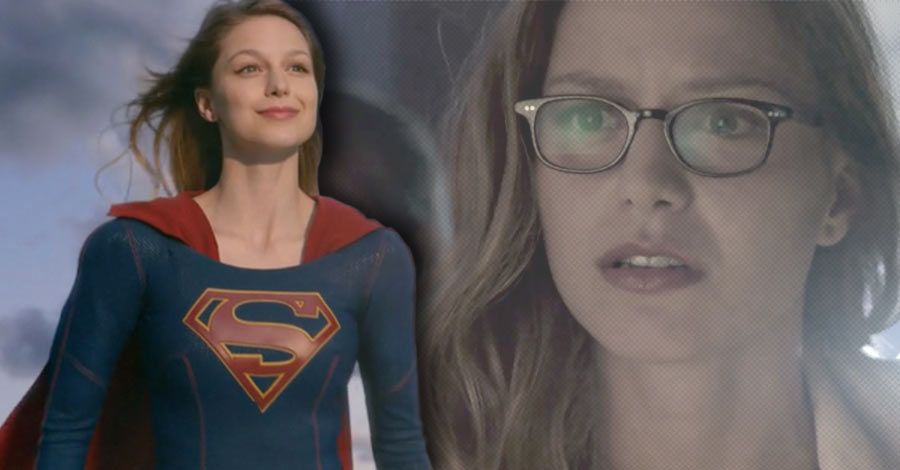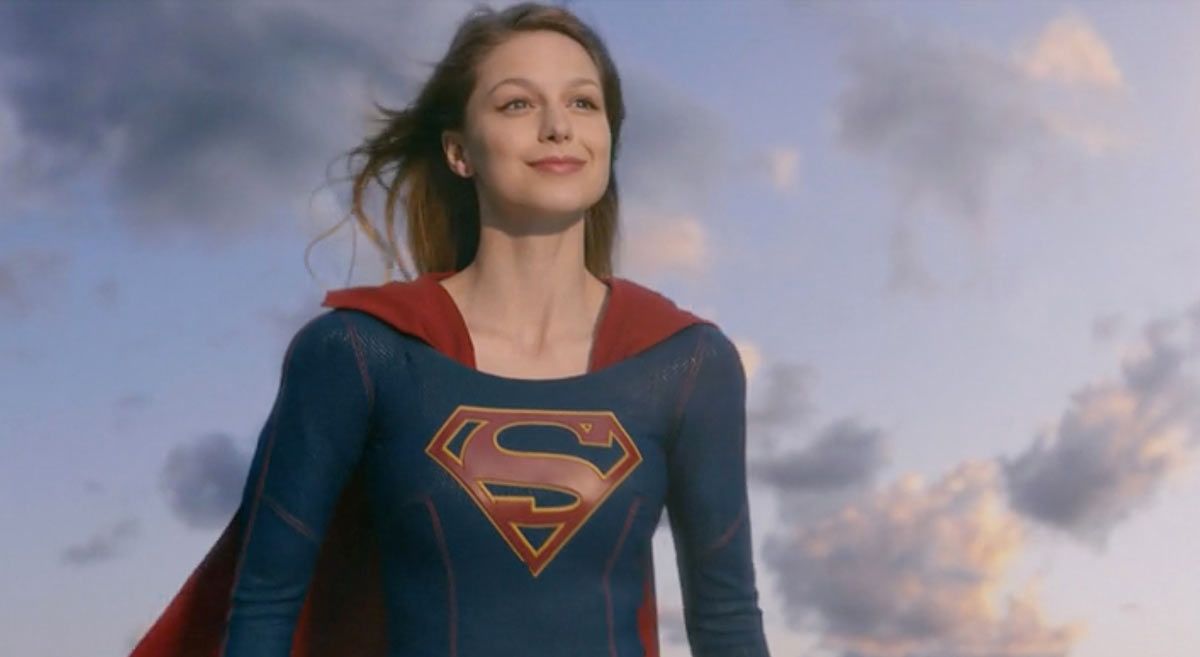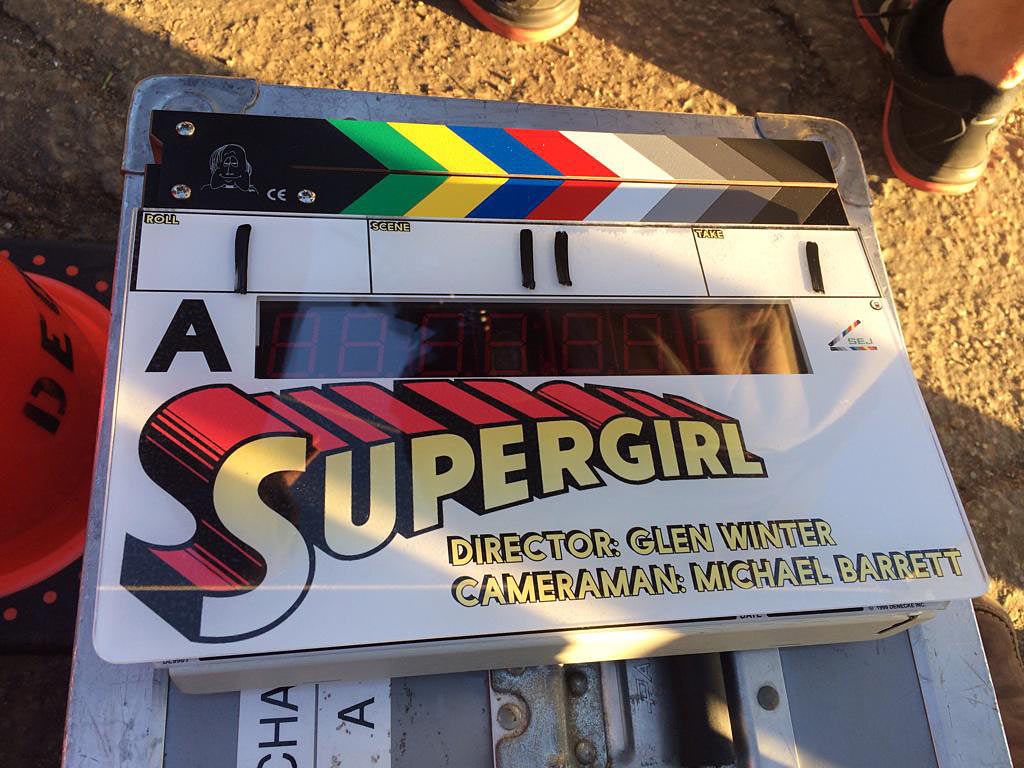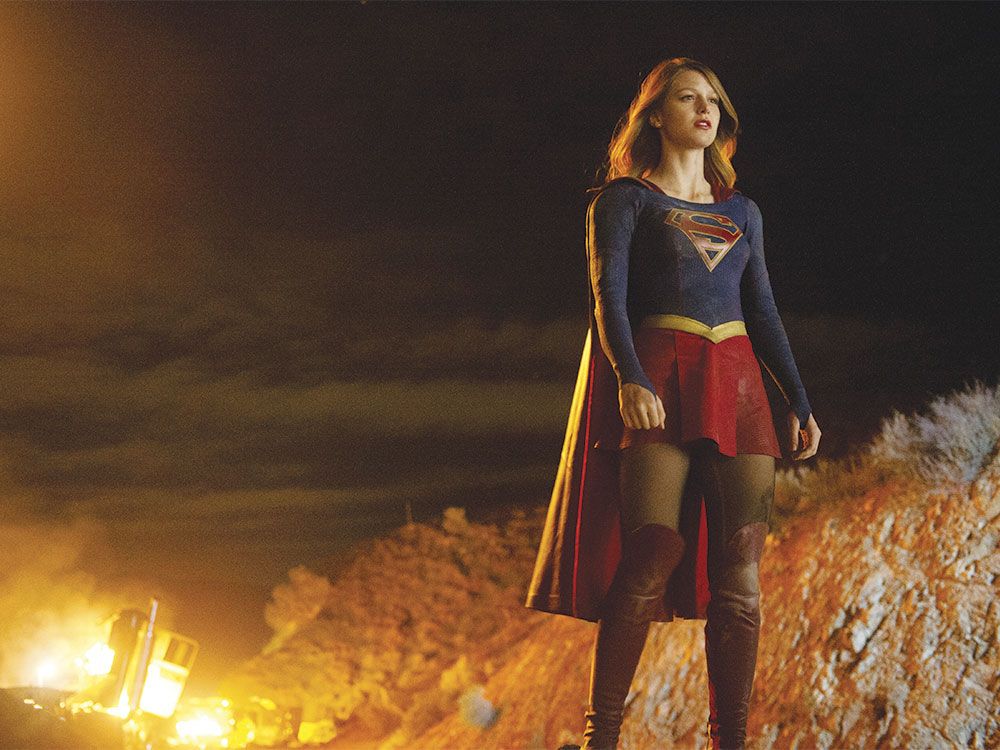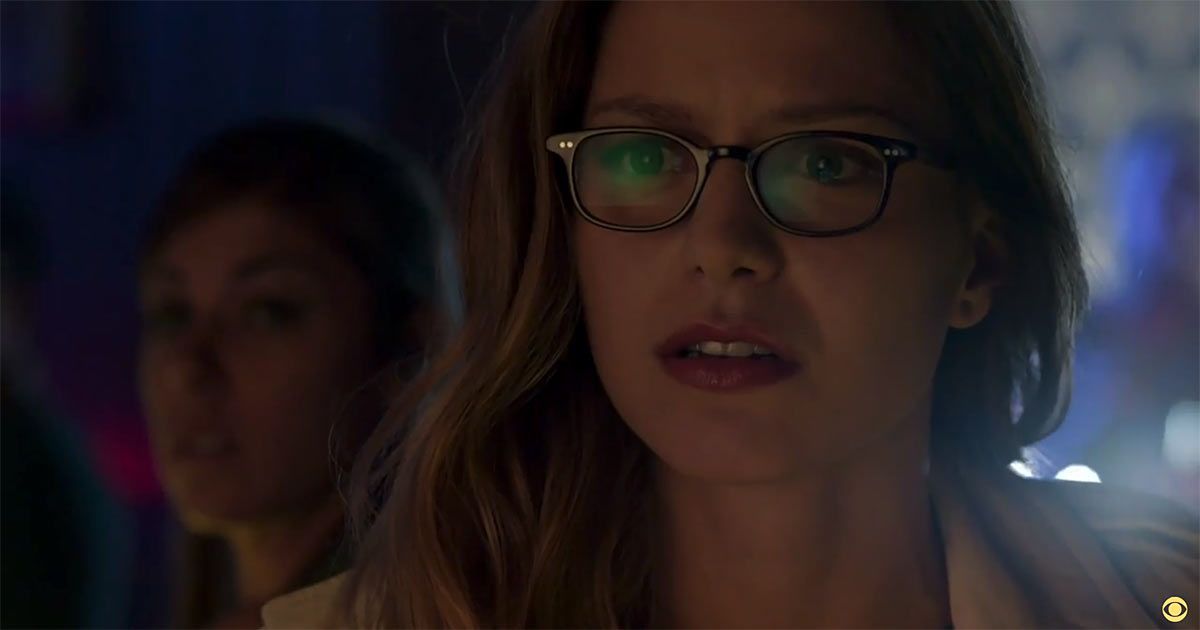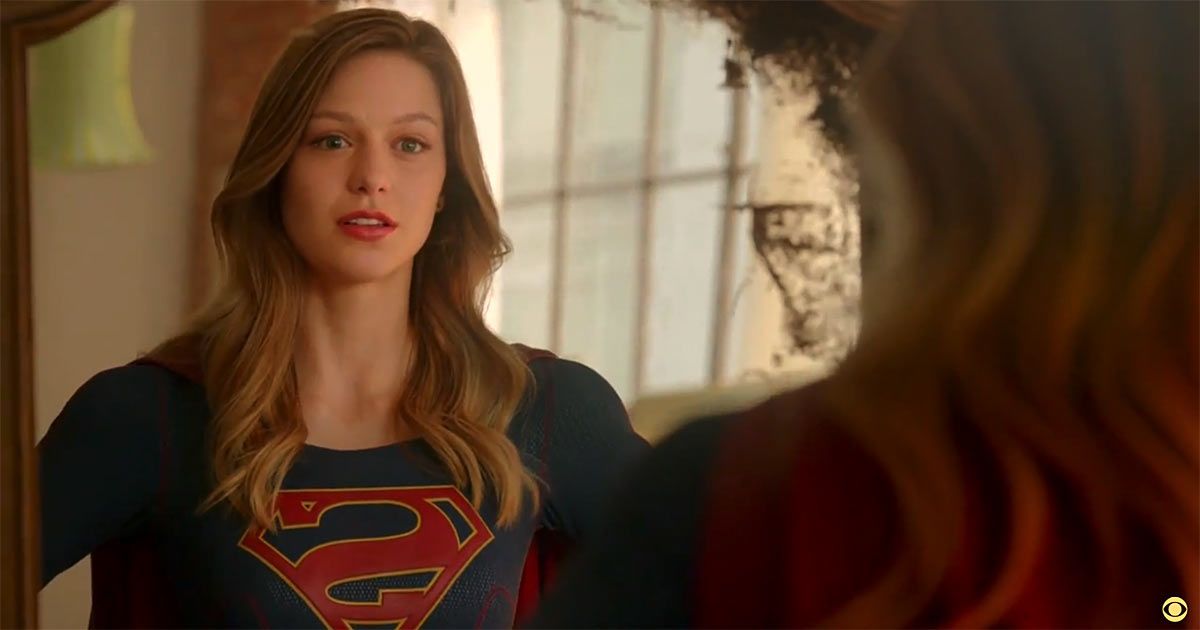It's a bird... It's a plane... It's Supergirl. The Maid of Might is cutting loose in CBS' new fall TV series, "Supergirl." The superhero saga finds 24-year-old Kara Danvers (Melissa Benoist) finally embracing her Kryptonian heritage and stepping out as costumed alter-ego, Supergirl. However, Kara will not only have to contend with everyday life and a secret identity, but the Phantom Zone villains that escaped from their prison when she originally crash-landed on Earth.
While many already know "Supergirl" was developed by Ali Adler and "Arrow" & "The Flash" Executive Producers Greg Berlanti and Andrew Kreisberg, they aren't the only familiar faces behind the scenes of the newest live-action TV series based on a DC Comics hero. Following a lengthy stint as director of photography on The CW's "Smallville," Glen Winter served in the same capacity on the pilots for both of the network's current DC-based series directed by David Nutter. With "Supergirl," Winter received his first shot at directing a pilot and setting the tone for TV's newest superhero series.
So About That "Supergirl" Trailer...
Ahead of Comic-Con International in San Diego, Winter spoke one-on-one with CBR News about tackling his first TV pilot as a director, the unique tone of "Supergirl," casting Benoist as Kara and how technological advancements have allowed more bang for the buck on network TV.
CBR News: CW viewers know you from "Smallville," "Arrow," and "Flash." How did the "Supergirl" pilot come about?
Glen Winter: I heard rumblings about it when "Supergirl" was first announced and that Greg Berlanti was going to be involved. I knew it was for CBS and that Greg was so talented, positive and enthusiastic. If anyone could do it, he could. And it sounded like an ambitious take on it because everyone has their preconceptions of what that character is. It would have to be done right, totally correct, especially given the previous attempts of making "Wonder Woman" and the "Bionic Woman" reboot. There had not been a lot of success and I thought, "If anyone could do it, Greg can." This was long before he was going to pull [in] Andrew. Quite honestly, with no false modesty, I never thought I would be considered. I just thought, "There's just no way they would consider me for the pilot and for something big." Even though I had experience on "Smallville," it's very rare that someone who has come up through the ranks the way I have will be given such an opportunity.
The first I heard about me directing was when I was down for the "Arrow/Flash" crossover in October in Los Angeles. They had a crossover screening at a movie theater that I flew down for. I was like, "I'm not going to miss this opportunity to see an episode of mine with a bunch of fans." Greg came up to me and said, "I just want you know you are my first choice for the pilot," almost as if we had been discussing it in the past, which we hadn't. I was completely blown away. "What? What?"
The next thing I know, [Warner Bros. TV President] Peter Roth is there and Greg is saying, "Yeah, here's Glen. We're interested in him doing the pilot." Peter was like, "Yes." I was completely caught off-guard. I was there with my son. Max had come down with me, who is 13. He witnessed the whole thing. From that point forward, it all it all just happened so quickly. Greg had been pushing for me all along, unbeknownst to me. Warner Bros., bless their hearts, were 100 percent behind his choice in me. They knew me from "Smallville." Every time I did an episode on "Arrow" or "Flash" that turned out well, Andrew and those guys went out of their way to point it out to the folks at Warner Bros. I think I just clawed my way into whatever status it would be where I would be considered for this show.
I had shot two pilots ["Arrow" and "Flash"] with Nutter as well, who was Warner Bros.' go-to guy. In addition to my own stuff, I think there was some appreciation for the fact that I had some on the floor experience with David and had been 100 percent part of his process on those other two pilots in the same genre. That certainly didn't hurt. I was still directing episodes of "Flash" and "Arrow." All of this was buzzing behind the scenes. It still wasn't a done deal because CBS didn't know me from Adam. I only had a relationship with Warner Bros. and nobody else. Greg had to convince CBS of the choice, as did Peter Roth. Both of them went above and beyond the call to put me in that position. That was a big risk for all parties involved. I was someone who had never directed a pilot before and was now directing one of the most expensive pilots CBS has ever done. So, I couldn't be more grateful to Peter and Greg for sticking their necks out for me. Then, around December, it became this very intense period of prep. I finished an episode and next thing I know, I'm down in Los Angeles.
The first thing on the agenda was testing Melissa [Benoist] and shooting screen tests because she didn't have the part yet. They were testing her up against a couple of other close contenders. Again, I think Greg and Warner Bros. were sold on her as the choice, but they had to convince CBS that she was the right call, which, of course they were able to do. I was part of those early screen tests and then eventually I found out I had the job officially. I have to say, being in the center of the machine at Berlanti Productions was an awesome experience. Greg is just great and articulate and passionate. It was just fascinating to be around that.
What's the difference between directing a pilot and an episode later in the season?
On "Flash" and "Arrow" specifically, I had a very long leash on those shows. I've obviously proven myself to them in a way they appreciate how I make those episodes. I tend to do longer takes, a lot more camera movement, a lot of what we call in-camera cutting as opposed to cutting in production. That means I try and tell the story with the camera within one shot as often as I can, just because I think it's more cinematic and more dynamic. They know I can shoot a show in that way and it won't screw them. Sometimes if you do that on a show, it can totally backfire. The producers can feel you are kind of going rogue with the show and you are not giving them enough "options" to cut the show as they want. You have to be careful with this responsibility you are given. It's important to be as ballsy as possible, but you can't go so far that you screw yourself and the show at the same time.
On "Supergirl," the biggest challenge was to try to keep my fingertips on the show, but also serve the needs of a pilot. The footage is going to be much longer than the show ends up. Frequently, for both "Flash" and "Arrow," the original director's cut came in 35 percent longer than the shows. The scripts are usually 60 pages. A lot of that comes because there's a lot of story, a lot of emotion and a lot of character in a very short time. You don't know until the show is actually shot as to the best way to tell that story. By the time the machine of a season starts going, there's a rhythm that happens. The scripts can be leaner, but in a pilot, everyone has notes. The producers have notes, the studio has notes, DC Comics has notes and the network has notes. Ultimately, all their ideas, in one form or another, make it into the script, which puffs it into a certain length. I couldn't shoot the show the way I normally do it, so I had to figure out how to make it as dynamic as possible, while still giving them the control they needed. That's the first thing.
The second thing was just the notion of developing a show from zero, from nothing, and building it up. Typically on a series, I've already inherited the momentum of the show and all the characters have been developed. You're exploring themes and ideas of a given episode, but the backstory is already there. A pilot has to be loaded with the most efficient way to tell people who these characters are, what their emotional drive is and what their background is in 42 minutes. I weighed in on that a bit, but it was mostly being able to witness how that happens because that's really Greg, Andrew and Ali's territory. Then, also, there's all the decision making and weighing in on the casting.
How would you describe the tone of "Supergirl" compared to some of the other superhero series? What was your vision for it?
We wanted it to be an intensely visual experience on as epic a scale as possible. We wanted to tell a story about a girl, in today's world, dealing with real-world issues, who happens to have super powers. Greg always says in these shows, "What if you took the powers away? What's left?" That's got to be why people come back week-to-week. It can't be because the girl has amazing super powers. For me, it was the story of a little girl, in a big world, growing up in a world that is not her home. All the things she's run into in her day-to-day life, be that as a young girl or a woman working in the middle of this bustling metropolis, it all has to be funneled through her point of view. I truly feel the tone of this show is a mix of the two worlds of "Flash" and "Arrow," where "Arrow" is quite dark and "Flash" is effervescent. Stephen [Amell]'s character is so brooding. Grant [Gustin]'s character is kind of a ray of light. The tone of this show is certainly closer to "Flash" than "Arrow," but it was important to keep this dark element of, "What's beneath the surface? What's in the DEO [Department of Extra-Normal Operations]?" It was also important for the villains to be as terrifying as possible, to make them the threat as realistic as possible.
I feel "Supergirl" has a larger scope than the other two shows. To me, it just feels bigger and has more individual tones. There's a romantic comedy, there's a working-girl environment, and then there's a dark, underground, almost "Homeland" vibe with the DEO. We have the science fiction element, the space element and all sorts of plans to weave all these tones throughout the season.
Did you take any direct cues from the comic books? How does the pilot pay homage to certain Supergirl moments or storylines?
I asked [the producers] about that in the beginning. I did a bit of research. Not being from a comic book background, a lot of this stuff wasn't as known to me. The real basic stuff, like who her parents were, the dynamic of her and Clark, and her arriving on Earth later, those were all from the original comic books.
As far as the story on Earth, I don't feel that they were overly dogmatic about it. As they did with the other shows, they take certain key elements that the comic book fans can pick out and say, "Oh yes, I know that character. I know their relationship." But, they don't let that hamstring them to the point of where it's hard to tell a story in the time they have to tell the story. And, for the most part, the viewers who will be watching this on CBS will not know the background of these characters. The producers always deftly make it as accessible as possible to an audience that doesn't have a comic-book background, but they don't want the fans to feel like they are ignoring the mythology. I think they've layered it just perfectly like the other shows.
"Supergirl" EP Reveals Superman's Role in the New Series
Kara gets a glimpse of a young Superman early on. What kind of discussions did you have about his presence in the pilot and beyond that?
Right from the beginning, it was discussed that he was to be a presence, but we didn't really want to see who he was. We didn't want him to be a character in the show that was interacting with Kara in any day-to-day way. We wanted to keep him alive because that's a really interesting part of her history on the show and also the dynamic that she kind of lives in his shadow. We didn't want to make it where we were creating another Clark Kent. This is her story. There was a lot of discussion about that. It was decided we would tease elements of him, but he would not be an interactive character in the story.
One of the things that struck me when I first read the script was when I saw that he was in it. I thought, "Wow, that's really cool. I didn't expect them to go there." What's even cooler now is the way he is a presence in the show without really being in it. That's original and I think people are going to be excited by that.
Melissa Benoist Describes "Supergirl" as Human & Empowering
Melissa is still a relative newcomer. What impressed you about her?
There was no contest. When Melissa was in front of the camera and doing her thing, she just had an amazing, beautiful natural charm to her right off the bat. Not only as a person, but also as a character. As luck would have it, there is a lot of Kara in Melissa. They are both kind of the same person. They are both a little charmingly clumsy. They both have this slightly not-aware-of-how-adorable-they-are. She was the character. Before I even read the pilot, I wasn't sure which way they were going to go with her. Were they going to go with the classic blonde beauty? I was concerned that they would go for looks or a certain archetype to service the audience demographic. I was concerned whether we would find the charm for a leading lady like this.
Helen Slater from the 1984 "Supergirl" movie and "Lois & Clark: The New Adventures of Superman's" Dean Cain play Kara's parents. Why was it important to land these two actors with such strong connections to the Superman universe?
Andrew and Greg love that stuff. I really had very little to do with the casting at that level. They've done it on "Arrow" and "Flash" as well. They love to bring in names that have a history in the genre and that also have a history to them. Not only are they comic book aficionados, but they are also television aficionados. To hear these guys talk about TV shows in the '70s and '80s -- and don't even get me started on "Star Trek" -- these guys are encyclopedias. Their knowledge of pop culture is so dense that if they have the opportunity to celebrate any of these people, they just love to bring people in. You haven't seen the last of it. I can tell you that.
How has technology changed the way you approached Kara's Kryptonian powers?
There are two major fight sequences in the show. Quite often, when they write these things, they write, "They fight." It's up to you to flesh out the beats. You can't just go for eye candy. There has to be an emotional rhythm to these fights. One of my biggest challenges was how to make these fights epic and something we hadn't seen before, but also how to make them dynamic. Her powers helped me figure that out and vice versa.
To answer your question about technology, we were able to use the best of actual physical rigging that exists today, where these guys can use wires in these incredible ways. You can actually shoot physical gags with the actors doing them in a safe way. You don't have to rely on visual effects all the time. It's much easier to shoot a a scene to make it look awesome if the actors are really doing it, and then have the effects guys erase the wires. That's an amazing use of technology. Wire removal has become so dirt cheap. In the old days on "Smallville," we used to have to budget for it.
In the pilot, we have two big fight scenes and the plane scene. Kara is flying with the plane. We were able to shot this gigantically epic scene, which for the most part exists in a CG 3-D world with green screen. Technology helped us shoot these incredible action scenes for real, but they also helped us shoot something that wasn't remotely real and was almost entirely CG.
When you see it, it holds up to a lot of feature visual effects sequences we've seen in the past. They would have had a year to finish that sequence on the next Superman movie. Our effects guys did it in a month to six weeks. The key is not to rely on one in its entirety; it's to figure out the best way the two can work together.
At the same time, you don't want to visually repeat Flash's super-speed or Clark's heat vision with "Supergirl."
Oh my God. That is my biggest sort of fear. Because of my experience on these other shows, even going back to "Smallville," I know everything we've done up to this point. For me, not to be burdened by what I know -- sometimes you have to do something that's been done before, but in a new way. Or, I know what works or doesn't work. It is very difficult to come up with a fresh take on it.
What's going to make this show very exciting and different is I think her powers can be very sexy. Maybe not even in a female way, but in a human body form manner. The way she's going to fight will almost have a "Crouching Tiger" element to it a lot of the time. Then, a lot of time it will be brutally vicious. We didn't really go too far into the super powers of it all on this pilot. There's some incredible flying and fighting, but we didn't get into a lot of the machinations. Her fight skills are very undeveloped, so there will be a lot of opportunity to play with her honing them. There will be an arc to them. There will be a good combination of the beautiful choreography we've seen on other shows, mixed with the brutal sensibility.
"Supergirl" premieres October 26 on CBS.

